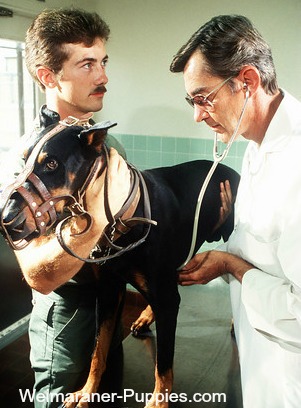Undescended Testicles in Dogs
Cryptorchidism in dogs or undescended testicles, is a fairly common condition, and it is considered to be a birth defect.
Occurring in almost 10% of male dogs, cryptorchidism in dogs is the failure of one or both testicles to descend into the scrotum, after birth.
Undescended testicles in dogs is the single most common disorder of sexual development in male dogs.
When a male puppy is born, his testicles are still located within his abdomen, just behind his kidneys. This is true for all dogs–not just Weimaraners.
As the male puppy grows older, his testicles slowly descend into the scrotum. Generally, both testes drop into the scrotum by about 8 weeks of age.
Some puppies do develop a little slower than others, but if one or both testes are not present in the scrotum by about 12 weeks of age, the puppy is probably cryptorchid.

they are 8 weeks old.
Does Cryptorchidism in Dogs Affect a Dog’s Ability to Breed?
When a testicle that has not descended normally, it is either within the abdomen or it may be located in the inguinal (groin) tissues, between the dog’s legs.
The undescended testicle is not able to produce sperm, and it is usually smaller than the other one. If both testicles are undescended, or cryptorchid, the dog is sterile. Even so, a male dog with cryptorchidism in both testicles, will still have normal mating behaviors, because the retained testicles still produce male hormones.
Technically, if only one testicle has descended, the dog is probably able to breed. However, since cryptorchidism in dogs is an inherited condition, a dog with this condition should not be bred.
It’s important to note that related female puppies (mother, sisters) can also carry the genes when they are in the same blood line—and they should not be bred either.
If you are thinking about getting a Weimaraner puppy that you will breed, make sure there is no history of undescended testicles in his hereditary background. This book published by Barron’s is very helpful for prospective Weimaraner owners and first time owners.
Treatment for Cryptorchidism in Dogs
Treatment is surgery. Additionally, castration is advised on dogs with an undescended testicle due to the high rate of testicular cancer in dogs with cryptorchidism.
Removal of an undescended testicle can be more complicated than a simple neutering procedure. When your puppy returns home try to limit his activity so he can heal quickly. Don’t let him lick or chew at his wound.
Related Health Problems for Cryptorchidism in Dogs
Dogs with Cryptorchid testicles can develop conditions like testicular torsion or testicular cancer.
Testicular torsion occurs when the spermatic cord twists and cuts off the blood supply to the testes. When the blood supply to a testicle, it causes severe pain to the dog. Treatment requires emergency surgery.
The other common medical condition found in dogs with cryptorchidism, is testicular cancer. Testicular cancer is the second most common malignant tumor found in older dogs. However, dogs with cryptorchidism are thirteen times more likely to develop testicular cancer than dogs with normal sexual development.
Neutering dogs with cryptorchidism, when they are still puppies, can prevent the development of cancer.
Dog Breeds Most Commonly Affected
Any dog can be born with a cryptorchidism issue, but some are more prone to it than others. The dog breeds that are most commonly affected are:
- Toy and miniature poodle
- English bulldog
- Pomeranian
- Chihuahua
- Dachshund
- Maltese
- Miniature Schnauzer
- Boxer
- Shetland Sheepdog
- Pekingese
There are two things that you can do to make sure that you don’t have a cryptorchidism issue with a puppy.
Check with the breeder to make sure that your new puppy does not have any cases of cryptorchidism in his background, and take your puppy for regular veterinary check-ups.




Leave a Reply